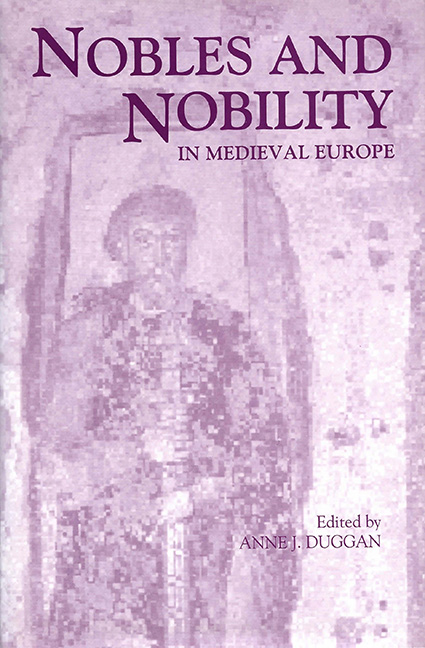 Nobles and Nobility in Medieval Europe
Nobles and Nobility in Medieval Europe Book contents
- Frontmatter
- Contents
- List of Illustrations
- Contributors
- Abbreviations
- Preface
- Dedication
- Introduction: Concepts, Origins, Transformations
- I Early Middle Ages
- 1 The Origins of the Nobility in Francia
- 2 The Nearly Men: Boso of Vienne and Arnulf of Bavaria
- 3 Nobility in the Ninth Century
- 4 Continuity and Change in the Tenth-Century Nobility
- 5 The Old English Vocabulary of Nobility
- 6 Nobles and Others: The Social and Cultural Expression of Power Relations in the Middle Ages
- II Central Middle Ages
- III Late Middle Ages
- Index
2 - The Nearly Men: Boso of Vienne and Arnulf of Bavaria
from I - Early Middle Ages
Published online by Cambridge University Press: 25 October 2017
- Frontmatter
- Contents
- List of Illustrations
- Contributors
- Abbreviations
- Preface
- Dedication
- Introduction: Concepts, Origins, Transformations
- I Early Middle Ages
- 1 The Origins of the Nobility in Francia
- 2 The Nearly Men: Boso of Vienne and Arnulf of Bavaria
- 3 Nobility in the Ninth Century
- 4 Continuity and Change in the Tenth-Century Nobility
- 5 The Old English Vocabulary of Nobility
- 6 Nobles and Others: The Social and Cultural Expression of Power Relations in the Middle Ages
- II Central Middle Ages
- III Late Middle Ages
- Index
Summary
The motto of this paper is taken from the writings of a man who was made noble, rather than born such: Alfred, Lord Tennyson. In his version of the story of King Arthur, The Idylls of the King, Tennyson describes a world of petty rulers struggling among themselves and reluctant to yield to Arthur's authority: ‘… for most of these,/ colleaguing with a host of petty kings,/ Made head against him, crying, “Who is he/ That he should rule us?” ‘This sort of question was asked with some urgency in the Carolingian world of the late ninth century as the descendants of Charlemagne lost their monopoly of the kingship to ‘petty kings’, reguli. These petty kings came from the ranks of the aristocracy. How did they make the leap from nobility to royalty? What sort of power and authority did they have to acquire before they could make this leap and how, and how well, did they convince their peers of their special status? One well-known answer to the question is Karl Ferdinand Werner's argument that the component parts of the Carolingian empire, the regna within the regnum, emerged as territorial principalities. Such a view has much to commend it, but its sheer loftiness, its view of long-term processes across the whole empire, means that it pays insufficient attention to the crisis of legitimacy that was a real concern for contemporaries as this new world emerged. At the political level, and probably at the structural level too, Jean Dunbabin's characterization of the new kingdoms and principalities as ‘a series of brilliant improvisations’ is, I think, more helpful for us in our attempt to reconstruct the realities of political upheaval.
I will explore these upheavals through considering the careers of two men, great magnates of the late ninth and tenth centuries: Boso of Vienne and Arnulf ‘the Bad’ of Bavaria. Both men established formidable power bases: Boso a kingdom based in Provence and Burgundy, and Arnulf in Bavaria, a duchy understood by contemporaries to be a regnum. Yet the achievement of both men was ephemeral. Boso was hounded by the Carolingian kings and Arnulf remained duke, not king.
- Type
- Chapter
- Information
- Nobles and Nobility in Medieval EuropeConcepts, Origins, Transformations (King's College London 1998), pp. 25 - 42Publisher: Boydell & BrewerPrint publication year: 2000


